Reports, stories and reflections from U-M Library assessment practitioners.
Tiny Studies

Posts in Tiny Studies
Showing 11 - 20 of 74 items

- Doreen R Bradley
- Ken Varnum
Working with large-scale datasets to understand the effect of library resources on student success raises a number of concerns around individual privacy, data security, and analysis. This blog post, summarizing a recent article in College & Research Libraries, describes a recent grant-funded project at the University of Michigan, discusses the steps we took to address those concerns, and some of the lessons we learned.
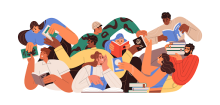
- Caroline Nemechek
The findings from a qualitative study on users of open access (OA) books reveal a wide range of needs and impacts. The data comes from two collections: one of OA books published by Lever Press (https://www.leverpress.org/) and the other of backlist books turned OA by the Big Ten Open Books project (https://bigtenopenbooks.org/). While the samples are small, the findings highlight the importance of qualitative approaches to capturing the variety of reader and, more broadly, user experiences.

- Suviksha Hirawat
This blog post reflects on the learning experience I had as a novice user research (UX) intern at the U-M Library. Through this nurturing and eye-opening experience, I enhanced my understanding of research operation, the activities which support the user research conducted by library employees in the Design & Discovery unit of the library.

- Ani Bezirdzhyan
We know very little about how authors and readers experience the impact of open-access (OA) books. Usage metrics and citations obscure their humanity. In Fall 2023, we interviewed authors and readers of monographs published as OA by the University of Michigan Press. Our qualitative research project documented their experiences, used AI to discover patterns in their responses, and provided evidence-based recommendations for improving OA book publishing.
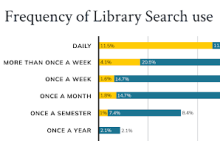
- Ben Howell
- Robyn Ness
The U-M Library UX + Design Team conducted a benchmark survey in late 2022 aiming to understand people’s experience with Library Search. Objectives included measuring user satisfaction, identifying audience needs, and comparing results with Harvard University’s survey using the same methodology. Survey findings guided the development of the Library Search Product Statement as well as user centered improvements such as implementing LibKey Direct-to-PDF API, and refining catalog results filters.
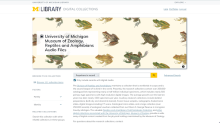
- Emma Brown
For the past year, U-M Library Digital Collections have been undergoing some big design changes. This blog post tells the story of launching and evaluating the usability of collections containing a new type of media: audio and moving images (AMI). In a research study consisting of a heuristic evaluation and 50 usability tests with a diverse group of users, the team uncovered over 20 mostly minor usability issues, recommended improvements to the interface that will be implemented in 2024 and beyond, and learned a lot about the complexity of library products along the way.
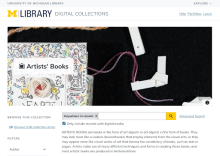
- Robyn Ness
User research is best performed as an iterative process, where each round of testing provides valuable insights to lead to the next stage of development. The recent uplift on the University of Michigan Library’s Image Digital Collections offers a prime example of iterative user research, as it included testing phases for early mockups, plug-in image viewers, and an interactive coded version of the site. By continuously testing, we were able to identify potential issues early and to refine the site to better meet user needs.

- Karen A Reiman-Sendi
Collaboration with students on library assessment projects is rewarding, both for the student and for the library. Student learning is front and center during any assessment project where the student is involved as a fully engaged team member. This post shares some thoughts about teaming up with students on assessment efforts.

- Zhenkun Lin
- Kelsey Mrjoian
University of Michigan Press is exploring different ways of communicating the “impact” of the open access program, Fund to Mission, with impact defined as “provable benefits on the real world.” As part of this exploration, the Press worked with Zhenkun Lin, a doctoral student from the U-M College of Engineering, under the auspices of the Rackham Doctoral Internship initiative. The charge for Zhenkun’s project was very broad: Please explore the data we have gathered and see if it suggests any interesting patterns or opportunities for visualizing the program’s impact.
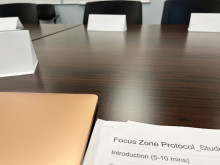
- Lulu Zhou
In Fall 2022, the Library Environments department began a pilot of two designated “zoned” spaces in response to user feedback asking for more information about what to expect from a study space. We conducted focus groups and integrated participatory design to learn about how users are perceiving and experiencing these labeled spaces.